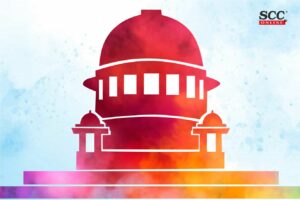Supreme Court: In a petition filed for seeking directions that till a new chairperson of the Intellectual Property Appellate Board (“IPAB”), is appointed, the incumbent should continue to function as Chairperson, the 3-Judge Bench of L. Nageswara Rao, Hemant Gupta and S. Ravindra Bhat*, JJ opined that,
“The amendments brought about through S. 184 of the Finance Act, 2017, in terms of the maximum age up to which any Member or Chairperson can hold office in a Tribunal could not apply in the case of the Board because the Rules of 2017 had fixed the tenure limits of chairpersons and members of tribunals, including that of the chairperson of the board.”
Factual Matrix
In the instant case, the applicant had sought extension of the term of the incumbent Chairperson of IPAB stating that S. 184 of the Finance Act, 2017, had prescribed the term of office and the conditions of service of Chairperson and members of various tribunals including that of the Board. S. 161 of the Finance Act inserted Section 89A to the Trade Mark Act which stipulated that the term of office of appointments to the board after the date of commencement of the Finance Act would be governed by the provisions of the Section 184 of the said Finance Act. The outer age limit of the chairperson of the board was 70 years, in terms of S. 184.
The applicant contended that though Section 86 of Trade Mark Act had prescribed the outer age limit as 65 years, that was over borne by the provisions of section 89A of the Act, which had stated that the terms and conditions hitherto applicable would no longer be so and that in matters of conditions of service and tenure of appointment, the provisions of section 184 of the Finance Act would apply.
It was argued by the applicant that taking into consideration the workload of the board, it was absolutely essential that it was headed by a properly qualified chairperson. The applicant particularly relied on Section 84(2) of the Trade Mark Act and urged that there could be no bench without a judicial member.
Analysis and Decision
Reliance was placed on Rojer Mathew v. South Indian Bank Ltd., (2020) 6 SCC 1 , by the Court wherein after pronouncing that the 2017 Rules were unsustainable, and quashing them, with a direction to the Central Government to frame new Rules, the Constitution Bench also directed as follows:
“Interim relief
- As the Tribunal, Appellate Tribunal and Other Authorities (Qualification, Experience and Other Conditions of Service of Members) Rules, 2017 have been struck down and several directions have been issued vide the majority judgment for framing of fresh set of rules, we, as an interim order, direct that appointments to the Tribunal/Appellate Tribunal and the terms and conditions of appointment shall be in terms of the respective statutes before the enactment of the Finance Bill, 2017.”
The Bench further noticed that on 20-03-018 the Supreme Court had clarified a previous order dated 09-02-2018 in Kudrat Sandhu v. Union of India 2021 SCC OnLine SC 89 as follows:
“(iii) The tenure of the Chairperson and the Judicial/Administrative/Expert/Technical Members of all the Tribunals shall be for a period of five years or the maximum age that was fixed/determined under the old Acts and Rules;”
Another contention raised by the applicant was that no member can function as a Chairperson, as none of the existing members were judicial members, but were technical members. The Bench observed, S. 84 (2) of the Trade Mark Act no doubt had stated that a bench of the board should consist of a judicial and a technical member. However, it was “subject to other provisions” of the Trade Mark Act.
“Section 87 enables a vice-chairperson, or as the case may be the senior-most member of the board to act as chairperson in the event of a vacancy to that position, significantly, Section 85 inter alia stipulates the qualifications for the post of chairperson or vice-chairperson.”
The relevant provisions of S. 85 of Trade Mark Act revealed that there was no bar for a technical member to be appointed as a regular chairperson, provided she or he had for “at least two years, held the office of a Vice-Chairperson”. In fact, the incumbent five technical members all hold legal qualifications (three of them holding masters in law, including one who had post-doctoral qualification). Four of these incumbent members were practising advocates in specialized fields of intellectual property (trademarks, and copyright) and one technical member (patents) had experience in the Patent Office.
“These members had practical legal experience of ten to fifteen years. The fact that they were appointed as technical members cannot obfuscate the fact that they are legally trained and qualified.”
Therefore, the contention that the technical members, in their position at the board as of now, could not function without a chairperson, was held unsustainable. Also the argument that the incumbent chairperson continued to remain in office in view of the declaration of law by Rojer Mathew was declared insubstantial and uncountenanced.
[The International Association for Protection of Intellectual Property v. Union of India, 2021 SCC OnLine SC 89, decided on 12-02-2021]
Kamini Sharma, Editorial Assistant has put this report together
*Judgment by: Justice S. Ravindra Bhat

